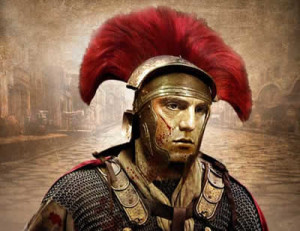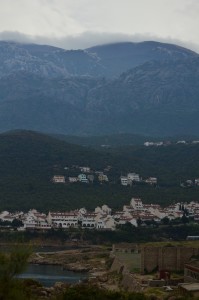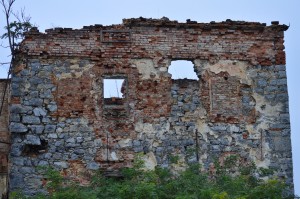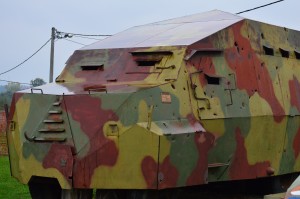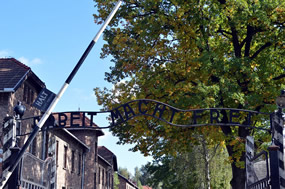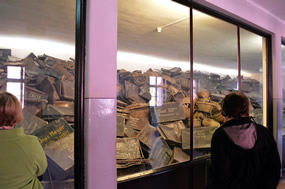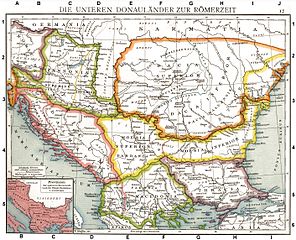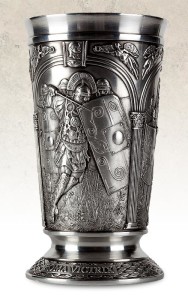Note: Although my books tend to be longer than average, that doesn’t mean that I don’t remove sections before I publish. Sometimes it’s strictly for considerations of space; a couple of times it’s been because my advance readers didn’t think it added to the story.
This excerpt from the Marching With Caesar®-Antony and Cleopatra series of books was removed for the former reason, and gives an account of what a mock combat in ancient Rome between Centuries and Cohorts of the Legions might have looked like. For fans of Marching With Caesar®, I hope that you will enjoy another glimpse of Titus Pullus, Sextus Scribonius, Diocles, and Miriam, along with the men of the 10th Legion.
I will be posting other deleted excerpts in the days and weeks ahead, and I thank all of you for continuing to clamor for more of what will be my favorite and most treasured character, no matter where Marching With Caesar® may take me, and you the reader.
I do not know who it was that first described our training as bloodless battles, but they obviously never participated in a mock fight. It is true that it is rare that a man is killed, yet every bed in the hospital is generally filled after one, mostly because of broken bones, while men are limping about for days afterward. We use the wooden weapons and shields, and we wear wicker faceguards, while most men pad their tunics and wrap their arms with sacking to protect themselves. Despite these precautions, there would still be more than enough bruises to go around. Not surprisingly, events like this engendered a great deal of wagering, men from a Century or Cohort betting on themselves to come out victorious. We started with small Century on Century bouts within a Cohort, timed to last a tenth part of a watch, the Pilus Prior serving as judge as to who carried the bout when it was not clearly obvious. In the mock battles where a First Century is involved the Optio runs the Century so the Pilus Prior can be free to judge, in my case that being Lutatius. There were three bouts for each Cohort, and I patrolled the area observing the battles as men bashed each other for all they were worth. Diocles followed me with a tablet taking notes whenever I saw some problem with technique among the men, or a Centurion who was handling his duties in a manner that I liked, or disliked. The most common mistake I saw being made by the new men was in their use of the shield as a defensive weapon only, instead of thinking of it as a weapon almost as potent as the sword that had the added benefit of providing protection. Some of the Centurions were not rotating their men through as quickly as I liked, and I had Diocles make a note of this as well. Dust began swirling in the air as men grunted, shouted and sometimes yelped in pain when they were struck with the flattened edge or blunted point of a sword. Occasionally a man would be badly enough hurt that they would fall to the ground, writhing in pain, and the medici would rush in to pull them out from underneath their comrades’ feet before they were more seriously injured. These exercises also served as a chance for some men to settle grudges with those from other Centuries involving past wrongs, usually concerning a woman or an unpaid debt. However, I had warned the Centurions to keep their eye on the men they knew were most likely to take the opportunity to get even. The first part of the day was spent Century on Century, with the men breaking for lunch, tending to their cuts and bruises while I talked to the Centurions about the performance of their respective Centuries.
The second part of the day we spent working Cohort on Cohort, requiring a larger space than normal, finding one easily enough a mile from the city walls. We marched out, attracting a ragtag band of followers who had heard that the Romans would be bashing each other and they were not about to miss the sight of that. I did not mind, thinking an audience liberally sprinkled with admiring women would make the men pay more attention to their training. I had directed the camp engineers to construct a wooden tower that could be mounted, asking Caecina, Corbulo and Balbinus to serve as judges, in exchange for my promise to do the same when it was their turn, along with an amphora of wine, not Falernian but of a decent vintage, to keep them refreshed in the hot sun while they watched. The platform on the tower was of an adequate size to allow them to sit on stools as they watched, so they settled in while we prepared by drawing lots to determine which Cohorts would face each other. These bouts would last a sixth of a watch, the winner of each then paired off against another winner, the odd Cohort out being determined by another drawing of lots. Since the time was limited, we would not array ourselves in the traditional three lines, but in a line of Centuries, each Century facing their same numbered counterpart to avoid confusion for the judges who could then count down the line and know which Century they were watching. Since we had neutral judges, that freed me up to lead my own Cohort. Given that we had drawn the lot for the third fight, it also gave me an opportunity to watch the first two bouts. A line was drawn down the middle of the field using a plow from a nearby farm, with each Cohort marching the same number of paces on either side, before making themselves ready for the charge. I had Valerius ready to give the signal with a blast of his cornu, and once I saw that both of the Cohorts were ready, I nodded to him. With a roar on either side, the men leaped forward at the sound of the horn, and even from where I stood I could feel the crash when the lines collided, shaking the ground beneath my feet. Almost immediately, my field of vision was obscured by the dust churned up by the hundreds of feet, the din tremendous as wicker shields cracked against each other, making a much different sound than was normal when we used our real shields, accompanied by men shouting in triumph, disappointment or pain as they whacked each other with their wooden swords. The competition was spirited, which I liked to see, the men seeming to really want to win the prize that was at stake for the winning Cohort, a week free of all duties, along with 20 sesterces per man, which was coming out of the Centurion’s purses, including mine of course. Men fell, clutching some part of their body while cursing their opponent, and I watched closely to see how quickly the man behind filled the hole, this being one of the most important aspects of the way we fight. The first bout ended, with neither side gaining a clear advantage from my perspective, and I made some quick comments to Diocles, who as always was at my elbow with his tablet, scribbling away. The next bout started as the “survivors” of the first two Cohorts mingled together, reliving their bout, some men boasting, others complaining about a moment during their contest, while the less fortunate had cuts and bruises looked at by the medici. I had ordered only water be available until all the bouts were finished, much to the men’s dismay, but I wanted clear heads for the whole day so I ignored the complaining as the next two contestants lined up to begin their mock battle.
Watching the two Cohorts, I saw that one of them was Scribonius’ Second, and I was pleased to see that his men were clearly getting the upper hand, if I remember correctly against Scaevola’s Eighth, who were being pushed back from the plowed line across almost every Century, except for the Third Century of Lucius Macro, his men refusing to give an inch. While this was admirable, in a real battle he would be responsible for the loss of every man in his Century if we were facing a competent enemy commander, and I told Diocles to make a note of it. As it was, he was facing an extremely able commander in the form of Scribonius who, seeing Macro’s Century essentially surrounded, moved quickly to take advantage by having his Second Century immediately peel the back four ranks from the formation, then led by their Optio, turn to drive into the flank of Macro’s Century. Macro’s Optio should have immediately countered the threat by doing essentially the same, but he was more focused on what was happening to his front than on his flank, his first indication being when an alarmed cry rose from the men in his rear ranks as they suddenly found themselves set upon from an unexpected quarter. Their cohesion collapsed almost immediately, and if it had been a real battle it would have been a slaughter. As it was, it was a huge embarrassment for not only Macro, but for Scaevola as well, and before the time was up the bout was essentially decided. I turned to Valerius, having him give the signal to end the contest before making my way to my Cohort to prepare for our own bout.
We had drawn the Third Cohort, led by Metellus, who was almost as good as Scribonius at handling his Cohort, a fact which I took extra pains to remind my own Centurions of before we began.
“You just saw what happened to Scaevola when one of his Centurions let his balls lead his brains,” I pointed out, pleased to see heads nodding, except I knew that when the cornu sounded it was hard to remember what one was supposed to do.
We lined up, and I saw Metellus standing across from me, grinning and throwing a salute, which I returned with the same. Then, the cornu sounded, and we went running at each other. Unlike our normal practice, I had gone ahead and equipped myself with a shield to begin with instead of waiting for a man to drop one when he was killed or seriously wounded since that was not going to happen, and I hefted it now as I aimed for Metellus, who let out a howl as he did the same. We crashed together, my size knocking him back, but he recovered quickly as he whipped his shield up, blocking my thrust neatly. He laughed as I cursed his quickness, then launched his own series of attacks, and I found myself having to move quickly to block the thrusts of his sword. Now I was cursing at myself for my overconfidence; by assuming that I could make a quick end to Metellus, I was counting that not only would I cripple the ability of the Third through the loss of their Pilus Prior, I would then be free to direct the whole Cohort, which was my first responsibility. However, Metellus’ skill and quickness were putting me at a disadvantage, except I could not afford to turn away from Metellus now, as knocking me out would not only hurt the Cohort it would be an enormous blow to my prestige. So I gritted my teeth then launched a furious offensive, counting on brute strength more than any skill. Now Metellus’ grin was gone as he desperately parried my rain of blows, while I was grunting with the effort it took to drive him backwards. Using a training shield, I did not have the same grip that I would have with a normal shield, making it hard to tip the shield from the vertical, and I had to content myself with whipping it sideways, while twisting my body from the waist, crashing the shield into Metellus’ from the side, my superior weight and strength knocking him sideways a step. I was not about to let my momentary advantage slip past, stepping forward for the kill, but Metellus’ cornicen, seeing his Pilus Prior in trouble, suddenly lunged at me, using his body to barge into my shield. I snarled at the man, having to stifle a laugh at his expression as he realized that he had just assaulted his Primus Pilus, but his intervention gave Metellus the time he needed to regain his footing, who now came at me, forcing me back on the defensive.
I was barely aware of how the rest of the Century, or Cohort for that matter, was performing. While it was just a matter of heartbeats that Metellus and I were engaged, I knew that I had to end my fight with Metellus and get to my real job of running my Cohort. When Metellus paused in his attack, I used the opportunity to renew my own, determined this time to end our personal battle by fair means or foul. Pressing close I pushed my shield hard against his, using my weight, to which he instinctively responded by throwing his into his own shield, which is what I had hoped for. Recalling a move I had been taught by Cyclops almost 30 years earlier, I suddenly threw my weight to my back foot, the sudden shift causing Metellus to lurch forward momentarily, though he recovered incredibly quickly, but it was enough of a lapse for me to exploit as I whipped the blunt sword over the top of his dropped shield, punching him hard with it in the chest, knocking him over. His pained curses were still ringing in my ears when I turned my attention to the overall situation, and I was pleased to see that Lutatius had seen me engaged and without asking moved forward to direct the Century, who were pushing Metellus’ men backwards. Seeing that this situation was in hand, I moved a short distance away from all the churning dust to survey the rest of the Cohort. Again I was happy that all along the front we were pushing Metellus’ Cohort back. As I watched and listened, the Centurions blew their whistles to sound the relief, men pushing off before moving to the rear smoothly, even the new men. Ironically, what happens in exercises like this, which I had even seen in some of the battles during the civil war, is that when both sides use the same system of fighting, there is often confusion when a Centurion sounded the signal for relief, men on the wrong side mistakenly thinking the signal was for them and moving aside, causing considerable confusion. About halfway through our bout, Metellus’ men rallied to begin pushing us back towards the plowed line, so that the action was hot and heavy for the rest of the time, but when it was over we had prevailed. After congratulating each Centurion and Optio on their fine work, I returned to watch the final two bouts, then went to consult the judges. While most of their decisions were no surprise, there were two bouts where they judged winners that I did not see the same way, but I held my peace.
The crowd continued to grow as the bouts progressed, now outnumbering us by several hundred, while there were a fair number of women as I had hoped. Some of them were Legionaries’ women, which was to be expected, but what I did not expect to see was a familiar slim figure dressed in brown smiling at me as I passed by.
I stopped short, gaping down at Miriam. “How did you get here?”
She laughed, pointing down at her feet, but her attempt at humor was lost on me, and I asked her sternly, “Did you come by yourself?”
“No,” she said quickly.
She turned, pointing to a burly slave, a man who worked as the gardener and handyman at Uncle Tiberius’ villa, so I was mollified. The second round started, and this time we had drawn the lot to go first, against the Sixth of Gellius. As expected, this was a much more hard fought contest, which we won by a small margin according to the judges, while Scribonius’ Cohort won their bout more easily than we had. Somehow I knew that we would end up facing them when all was said and done, and I was eager to test my Cohort against his. The men still in it were starting to get tired, but were no less eager to try to claim the top prize than their Centurions, who walked about in between bouts encouraging their men or correcting problems they had seen. The crowd was getting raucous as well, seeing that the final bout was approaching, each person picking a favorite Cohort of those left to fight. This caused some hard feelings among men whose Cohort were eliminated, especially when they saw their own women now cheering on men from other Cohorts, making for some sharp words between couples. Frontinus’ Tenth was the Cohort that drew the lot to sit out the two bouts of the second round, and I was impressed at their performance in the first round, given that the Cohort was composed almost entirely of new men. Since we had gone first and had won the second round, that meant that we would face Frontinus to see who would square off against Scribonius and the Second.
“You better win this,” Miriam told me as the men moved into position. She had maneuvered so that she was in the front row, helped in part by the crowd seeing that she was obviously with me and giving her room. “Scribonius will never forgive you if you don’t face him in the final bout.”
“I wouldn’t forgive myself, but Frontinus has handled his Cohort well,” I replied. “Let us get through this before I worry about Scribonius.”
We lined up facing Frontinus, the men calling out insults at each other across the distance, their spirits high and their blood up. At the cornu blast, we went roaring forward, the ground once again shaking from the impact, the dust quickly swirling up into the air. This time I did not head directly for Frontinus, instead choosing to direct my Century in the action, while keeping an eye on the rest of the Cohort. There had been a nagging worry about facing Frontinus’ men in the back of my mind, and my fears were borne out as the time passed without either side gaining a clear lead. The one positive that Frontinus had was in the overall youth of his Cohort, so that when we were unable to gain an immediate advantage, the resilience of his youngsters started to show itself. While I was signaling for shorter shifts, Frontinus was able to keep his men in place longer but still keep them fresh. When I ran down the line I saw that every one of my Centuries was in a similar state, the older men of my Cohort panting and sweating profusely when they came to the rear, their faces red from the exertion.
I found Balbus exhorting his men, his face grim when I reached his side. “These youngsters are giving us all we can handle,” he said, spitting on the ground in disgust as one of his men took a staggering step backward. “We better do something quick or they’re going to wear us down.”
I told him I would think of something, then ran back to my Century and found Lutatius, who echoed Balbus’ words.
“I know,” I snapped. “I’m thinking.”
I looked over to see Vellusius standing waiting his turn about three men back. I could see his chest still heaving from his exertions when he had been in the front line, and here he was just moments away from doing it again. It was clear that in this case the fitness of the youngsters in the Tenth was a clear advantage over the experience of the men of the First. My mind raced desperately, trying to find a solution. We had been pushed back a few paces from the plowed line, which at that point was not an insurmountable distance to regain, but unless something happened our chances of fighting back to not only regain the ground we had lost but push the Tenth Cohort back were waning with every moment.
I estimated that we were about halfway through the bout, so I decided to risk it all by taking a page out of Scribonius’ book. Running over to each Century, I pulled the back four rows, sending half to either side while snapping out instructions to the Centurions. Sending Balbus over to the right flank, it was only after telling him what I wanted before I ran back to the left. Gathering the men I grabbed together, I turned my back to the fighting to give quick instructions so that Frontinus would not immediately divine my intentions. Looking over to where Balbus was with his men, I gave a wave, then signaled the men with me to follow, and went trotting away from the left flank as if I was leading them off the field and into the crowd gathered on that side. I heard the gasps of surprise and excited comment from the crowd as suddenly a group of armed Legionaries appeared to be heading directly for them, but before we reached them I nodded to Valerius, who gave the blast of the cornu that was the signal to Balbus, who was doing the same thing as I on his side.
“Let’s show these brats what the First is all about,” I roared, suddenly wheeling about to begin sprinting towards the right flank of Frontinus. To his credit he had seen and understood my intent, and now was trying to get some of his men turned to face us and Balbus, but my men knew what was at stake. Summoning the last of their energy, they went sprinting full speed into Frontinus’ flanks. The impact was terrific; even over the din of the collision I clearly heard the gasps of the audience, but while Frontinus’ men put up a spirited defense, they could not resist the sheer force of our charge and began bending back into their comrades. As I had hoped, this disruption caused considerable confusion when men found themselves jostled and pressed by their own comrades who were desperately trying to hold back the sudden thrust to their flanks. Within a matter of moments, both pincers drove far into the rear of Frontinus’ Cohort, our two forces almost meeting in the middle, the bout effectively over, the confusion of having men behind them rattling the youngsters to the point where they stopped listening to the commands of their Centurions and Optios to just begin lashing out wildly in every direction. It became a wild melee that quickly degenerated into a brawl, taking a great deal of effort to restore order and separate the two forces. Frontinus was extremely angry, and I suspect that it was aimed in equal parts at his men and at me for what I had done, but since I was his superior he could not take his anger out on me, so his men had to bear the brunt of it as they were marched off, with my men jeering them on their way.
That left the First facing the Second Cohort, the sun sinking lower in the sky, giving us just enough time. The Cohorts knocked out of the contest were now mingling with the crowd, their Centurions lifting the restriction on consuming wine, so the festival atmosphere became even more boisterous, though I was happy to see that the Centurions had taken the precaution of making them leave their weapons stacked in their area. Even if they were wooden, they could be deadly in the hands of a drunken Legionary who lost his head and attacked an unarmed and unprotected civilian, for whatever reason. While we made ready to face the Second, the betting was lively among our comrades, seeming to be evenly divided between the two Cohorts. I stood with Miriam, who was clearly nervous, though I was not sure whether it was the prospect of me facing my best friend, or just at seeing the parade of men being carried off the field. We had sustained more than a hundred injuries during the day throughout the Legion, one of them extremely serious when a man’s helmet was knocked off because he had forgotten to tie his chin strap and he had been struck in the head. He was carried off with blood pouring from his ears, a sure sign that his skull was fractured and there was bleeding inside his brain, so it was likely that he would die. Fortunately the other injuries were not life threatening, though there was a fair number of broken arms and ribs.
Now as we were lining up for the final bout of the day I looked across at Scribonius, whose face was set and businesslike while addressing his Centurions. I considered Scribonius the best Centurion in the Legion, and I had made my wishes clearly known that he was my choice to become Primus Pilus in the event that I fell, something that even the next logical candidate, Balbus, supported. Scribonius was definitely more cerebral than I when it came to fighting and directing a Cohort, so I did not expect him to come charging at me, sure that he would prefer to direct his Cohort while being available to move to any trouble spot. Naturally, that is exactly what he did the instant the cornu blast sounded, shouting to his men as he came sprinting directly for me, holding his shield high and slightly to the side so that it would not bang on his legs as he ran at me. I barely had time to get my own shield up and in position to accept his charge, and despite outweighing him by a goodly amount I took a staggering step backward from the furious attack he unleashed. Scribonius’ technical skill was very, very good; what he lacked was the gift of fury, but for some reason on that day he seemed to have found it, and I found myself reeling from the savagery of his thrusts. I was so absorbed in trying to keep him from scoring a damaging blow that I had no idea how the Century, let alone the rest of the Cohort was faring, though it was clear that the men were fully engaged by the roar of sound. The crowd was cheering wildly, all the previous bouts of the day leading up to this moment, with the two Cohorts evenly matched. Scribonius’ arm was a blur of movement, the tip of his sword flickering about the edge of my shield looking for an opening, while I was desperately whipping it about to block him, waiting for him to pause a moment, knowing that he could not keep the pace up much longer. Finally he took a breath, and knowing I could not hesitate I unleashed my own onslaught.
Now it was Scribonius’ turn to be on the defensive, but as much as I tried I could not penetrate the barrier of his shield, despite being gratified to see the sweat streaming down his face with the effort. I grimly realized that of course I could not best him so easily; Scribonius had been watching and practicing with me for more than 20 years, so who else knew my movements almost as well as I did? However, that was a blade that cut both ways, that knowledge giving me confidence as I continued my own attack. The contest was still even, both sides still straddling their side of the plowed line, the men pushing, grunting and bashing away all up and down the Centuries. The whistles were sounding the changes in shift, while Scribonius and I kept battling. I felt the sweat pouring down my face as my arms grew heavy with fatigue, but I could see Scribonius was feeling much the same. Neither of us could gain a clear advantage, despite both of us landing blows that stung the other, and I knew that my arms would be covered in bruises even with the extra padding. We continued our own private battle, Scribonius and I, so that neither of us were doing the job of running our Cohorts.
Fortunately for both of us we had experienced Centurions who knew what needed to be done and were professional enough not to get locked in a private battle with a counterpart, unlike the two of us. I lost all track of time, which I think Scribonius did as well, because his look of surprise when the cornu sounded the end of the bout mirrored my own. My arms were aching, both from fatigue and from the blows that had rained down on them, so even if I had wanted to I doubted that I could raise my arms back up to either defend myself or continue the attack. Scribonius and I glared at each other for several heartbeats, the heat of the moment still coursing through our veins, then he abruptly gave a laugh, breaking the spell of battle between us.
“I never thought I would last that long,” he admitted.
“Neither did I,” I replied honestly, and in truth I was still a little stung that he had, taking it as another sign that I was getting old.
My only consolation was that he was clearly as exhausted as I was, and we walked over to talk to the judges to get their decision, while men were sprawled on the ground, still panting from the exertion of what had been the hardest bout by far.
“We’ve been in battles that were easier,” was Scribonius’ comment, and I had to agree.
The watching crowd was talking excitedly, arguing about who they believed the victor was, and it occurred to me that there was going to be some excitement as the winner was announced, while the losing side voiced their displeasure. I was not prepared for what was about to come, however.
“The decision is unanimous,” Corbulo announced to Scribonius and I. “It’s a tie.”
“A tie!” Scribonius and I exclaimed at the same time, both of us incredulous at the decision.
I could feel the eyes of the entire crowd on us as we stood there, my mind racing as I tried to decide what to do, having little illusion that announcing that in effect there was no winner from the last bout would not go over well.
“Neither side gained an advantage,” Corbulo said defensively, pointing down to the plowed line. “Look, both Cohorts ended up in the exact same position they started.”
“How many men from each side were carried off?” I demanded, thinking that if there were a clear advantage on one side or the other this could be used to declare victory, but Corbulo shook his head.
“We already took a count. Exact same number on both sides.”
Now I was desperate. “How many broken bones?”
Scribonius laughed, thinking I was joking, but when he saw my face, he exclaimed, “Gerrae! You can’t be serious. Do you really want to win so badly?”
I shook my head, jerking my thumb to the crowd behind us, which was growing restive at the delay of the announcement. “It’s not me, it’s them. Look at them. This could get very ugly very quickly.”
He looked over my shoulder then mouthed a curse. “You’re right. So what do we do? I don’t suppose you’re willing to concede?”
I looked at him in a mixture of anger and astonishment. “Me? Why me? Why not you?”
“Because in my mind we beat you,” he replied calmly, only serving to infuriate me more, as he undoubtedly knew it would.
“That’s not how we see it,” Balbinus interjected firmly, and I gave Scribonius a triumphant look, but he was not finished. “But neither do we think the First deserves the victory either.”
“What are you talking about?” I protested, but my words had no effect.
It was clear that we would not agree, so I was about to turn and face the consequences when Corbulo offered up a suggestion.
“Let’s flip a coin,” he offered, pulling out a gold denarius from his purse.
I saw that it was one of those issued by Antonius, with the profile of the Triumvir on one side wearing a crown and his full image on the reverse side, dressed in priestly garments. I looked over at Scribonius, who shrugged, clearly not liking it any more than I did but knowing that this was the best solution available.
“I’ll take tails,” I said, not willing to pick something with Antonius’ face on it and using my seniority to make the choice, though Scribonius did not protest.
Corbulo tossed the coin, it winking gold in the air as it flipped over and over, and I realized that I was holding my breath. I suspect Scribonius was as well, both of us almost jumping at the smacking sound as Corbulo slapped the coin onto his forearm then lifted his hand. I bit back a curse at the sight of Antonius’ face staring up at me.
“It’s heads,” Corbulo announced, then turned to me, but I was not feeling gracious at the moment, so I muttered that he should make the announcement.
Turning to the crowd, he shouted that the judgment was that the Second Cohort was the winner, and there was a roar of sound that almost punctured our eardrums, made of equal parts rejoicing and anguish from the sounds of it, as money or sexual favors changed hands. Scribonius and I stood next to each other, and truly if it had been any other Pilus Prior I do not believe I could have done it, but I grabbed his hand then raised it in the air, even as I gritted my teeth while doing so.
We marched back in the dusk, the men in roaring good spirits, singing and recounting their various exploits to their friends, while the crowd followed behind us in an equally festive mood. There is little to relieve the drudgery and toil of most people’s lives, and this had provided an excellent diversion from the mundane, a fact that Miriam kept reminding me of as she walked beside me. I must confess I was in a full-blown sulk; I hate losing at anything, and I am anything but gracious when it happens. I told myself that if it had been a clear-cut victory of the Second over mine I would have been in a better frame of mind, but I know that is just something I was telling myself to make it easier. The men of the First were similarly disconsolate, and of all the Cohorts they were celebrating the least, marching glumly along, the bitter taste of such a close loss stilling their tongues. After a bit, Miriam fell silent, sensing that there was nothing she could say that would make my mood any better. As we marched, I thought about the injustice of having the outcome decided by the flip of a coin, and I chided myself for what I now saw as caving in because I was worried about the crowd’s reaction.
As if reading my mind, Miriam said quietly so that only I could hear, “You did the right thing Titus Pullus.”
I shot her a surprised glance. “What do you mean?”
“I saw the other Centurion, what is his name, Corbulo? I saw him flipping a coin. I know that must not sit well with you, but you were not in the crowd, I was. If there had been no decision things would have gotten ugly.”
Despite knowing she was telling the truth and trying to make me feel better, I was not gracious. “What do I care what this mob thinks? It shouldn’t have ended this way.”
“This mob outnumbers your Legion,” she observed, and I was about to retort, but she was not finished. “And who do you think was doing the most wagering? Your men, not the crowd. They were the ones who would have been angry. There is no telling what might have happened.”
I heaved a sigh then draped my arm about her thin shoulders. “You’re right,” I said grudgingly. “But that doesn’t make it any easier to deal with.”
“I know,” she patted me on the arm, and it felt oddly comforting. She turned to another question. “What about you and Scribonius? Are you angry with him?”
I was surprised but I should not have been, for she was wise beyond her years and sex.
“Yes and no,” I finally admitted. “I think I’m more upset with myself than with him. This is the first time in a long, long time where I haven’t bested my man.”
“At least it happened with your best friend though, is that not true?”
“I suppose,” I sighed. “In some ways it’s worse. Do you think I’m getting too old?”
I looked down at her, realizing suddenly that it was extremely important that she did not think so, and she rewarded me with a laugh, a real laugh and not one just to make me feel good.
“No Titus Pullus. I do not believe you are too old. In fact you proved that you are not too old just last night, did you not?”
She blushed prettily, and now I was the one who laughed. “Let’s see if I can do that again.”
